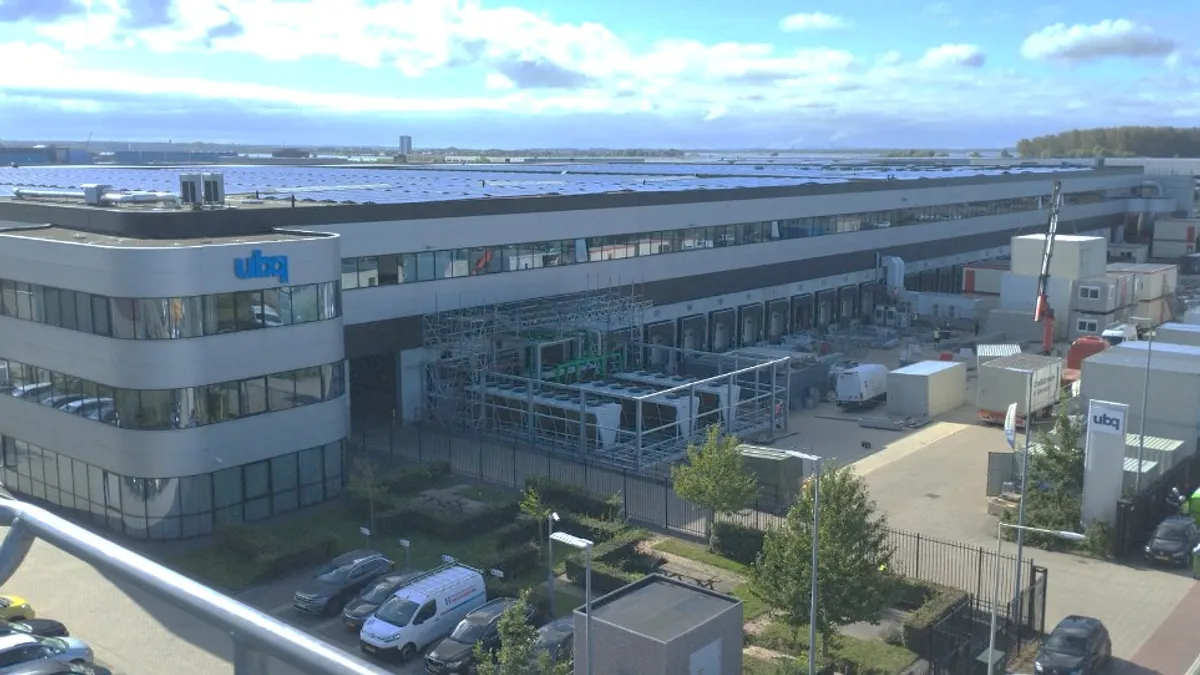Dive Brief:
- UBQ Materials, an Israel-based company that converts mixed waste into thermoplastics, is looking to expand into the U.S. The company is targeting Massachusetts for a potential facility given the region’s limited disposal capacity.
- In November, the company opened its first large-scale production facility in the Netherlands which can produce up to 80,000 tons of material per year. This followed a $70 million funding round, led by Eden Global Partners, that closed in September.
- Co-founder and co-CEO Jack Bigio said during an interview at the MassRecycle conference last week that UBQ’s U.S. facility could be similar in size to the Netherlands location. The company has not yet determined timing, as it’s still assessing legal and permitting requirements.
Dive Insight:
UBQ, which launched in 2012, has started to gain scale in terms of its production capabilities and high-profile brand partnerships. The company said growing demand from brands for bio-based materials and postconsumer recycled material is helping drive this market.
After initially launching with a small-scale facility in Israel, UBQ has grown with a $170 million funding round led by TPG Rise in 2021. This supported construction of the Netherlands facility and also drove the development of new products made from the company’s unique material.
“It's a new material that never existed before,” said Bigio. “I would call it upcycled material, because we're taking very low-value and problematic streams that will end up producing methane and all kinds of hazards in the landfill, and bringing them back in the form of a thermoplastic that can replace oil-based plastics.”
The company’s patented process entails removing metals and glass from mixed waste streams, before sending the waste through a system that uses heat to break it down to basic elements such as lignin, cellulose, fibers and sugars. From there, those elements are reassembled into a “matrix” that can be used as an additive or replacement feedstock for thermoplastic applications. According to a life cycle analysis by Quantis, this can yield greenhouse gas savings when compared with using standard plastics.
Bigio said the company uses residual energy from its machinery to power dryers that are used on the waste stream, and water discharge is not a factor as existing moisture in the waste stream evaporates during the process.
Figuring out how this system fits into the U.S. permitting landscape is an ongoing process, as the company says it doesn’t consider the technology to be a form of recycling or plastic production. Arranging a steady supply of feedstock may also be different in the U.S.
UBQ’s BOZ facility in the Netherlands has the capacity to handle an estimated 104,600 metric tons of material per year, but this waste is often pre-treated by industry partners to create a material similar to feedstock for making refuse-derived fuel. UBQ is still assessing how and where it would source material from municipalities or companies in the U.S. market.
But they say the business model itself is straightforward, and can be competitive in a region with tip fees that are among the most expensive in the country.
“The idea is for the tip fee to be substantially below the current tip fee for the disposal of material because UBQ will, like a recycling facility, make money on the back end as well,” said company consultant David Biderman. Bigio added that “the real margin” is on sales of the products themselves.
UBQ’s material can be used for a range of durable and semi-durable products, such as car parts, footwear, pallets and secondary packaging, hangers, display stands, panels, planters, pipes or roofing. Some of the higher profile customers include Mercedes-Benz, PepsiCo and McDonald's. While the company previously considered pursuing food-contact approval for its packaging, Bigio said that is not currently a priority as there’s more market potential in scaling the use of PCR in other areas.
The Massachusetts Department of Environmental Protection reported that 6 million tons of waste were disposed in the state during 2022. This was down slightly from 2021, but up from 2018 and not declining at the rate needed to achieve the state’s 2030 waste reduction goals. The amount of MSW being exported also rose in 2022, and regional disposal capacity could shrink further in the years ahead.
The agency recently released a Recycling Market Development Action Plan that highlights potential ways to attract and scale more recycling businesses, though it doesn’t explicitly mention a use case such as UBQ’s. The state’s 2030 plan also calls for a reduction in volumes of multiple types of plastic, including bulk rigid plastic items which could encompass certain UBQ products.
Bigio said the addition of UBQ doesn’t affect the recyclability of any finished products. “You cannot know that there is chicken bones and hamburgers here,” he said, pointing to a jar of UBQ pellets, adding that MRF sensors will identify whatever the dominant resin type is in a given product.
UBQ is working to scale up staff with the latest round of funding as it assesses the potential for what could be the first of multiple North American facilities. Bigio said the company is also looking at scaling in Europe, with the next facility expected to be “three or four times bigger” than the current Netherlands site.
Correction: The previous caption to this story erred in giving the output volume of UBQ's BOZ facility. It can produce an estimated 80,000 tons of finished product a year.










